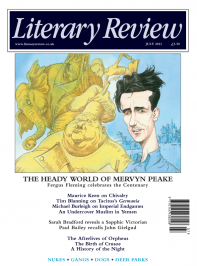Donald Trelford
Mad On Paper
First Lady of Fleet Street: The Life, Fortune and Tragedy of Rachel Beer
By Eilat Negev and Yehuda Koren
JR Books 342pp £20
This is a book that many journalists on The Observer and The Sunday Times must wish they had thought of writing. Rachel Beer’s name has always cropped up in articles about the two papers’ histories as the woman who, however implausible it may sound, edited both at the same time at the turn of the twentieth century before going mad. That, however, was all the information anyone seemed to have. Now, thanks to Yehuda Koren and his partner (‘in life and in work’) Eilat Negev, that is no longer the case. Indeed the authors, both Israeli journalists, have unearthed more material than they can comfortably handle.
At first it seemed strange that the subject should be approached from such an explicitly Jewish angle, but it soon becomes clear that this makes perfect sense. Both Rachel Beer, born a Sassoon and aunt of Siegfried, and her husband, Frederick, came from immensely rich Jewish families –

Sign Up to our newsletter
Receive free articles, highlights from the archive, news, details of prizes, and much more.@Lit_Review
Follow Literary Review on Twitter
Twitter Feed
It wasn’t until 1825 that Pepys’s diary became available for the first time. How it was eventually decrypted and published is a story of subterfuge and duplicity.
Kate Loveman tells the tale.
Kate Loveman - Publishing Pepys
Kate Loveman: Publishing Pepys
literaryreview.co.uk
Arthur Christopher Benson was a pillar of the Edwardian establishment. He was supremely well connected. As his newly published diaries reveal, he was also riotously indiscreet.
Piers Brendon compares Benson’s journals to others from the 20th century.
Piers Brendon - Land of Dopes & Tories
Piers Brendon: Land of Dopes & Tories - The Benson Diaries: Selections from the Diary of Arthur Christopher Benson by Eamon Duffy & Ronald Hyam (edd)
literaryreview.co.uk
Of the siblings Gwen and Augustus John, it is Augustus who has commanded most attention from collectors and connoisseurs.
Was he really the finer artist, asks Tanya Harrod, or is it time Gwen emerged from her brother’s shadow?
Tanya Harrod - Cut from the Same Canvas
Tanya Harrod: Cut from the Same Canvas - Artists, Siblings, Visionaries: The Lives and Loves of Gwen and Augustus John by Judith Mackrell
literaryreview.co.uk